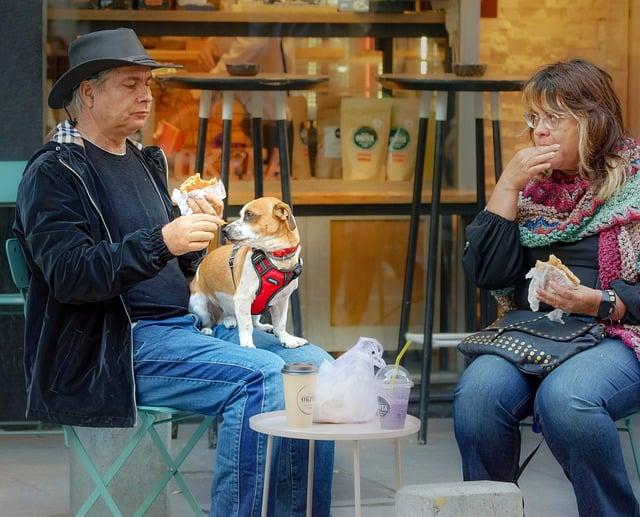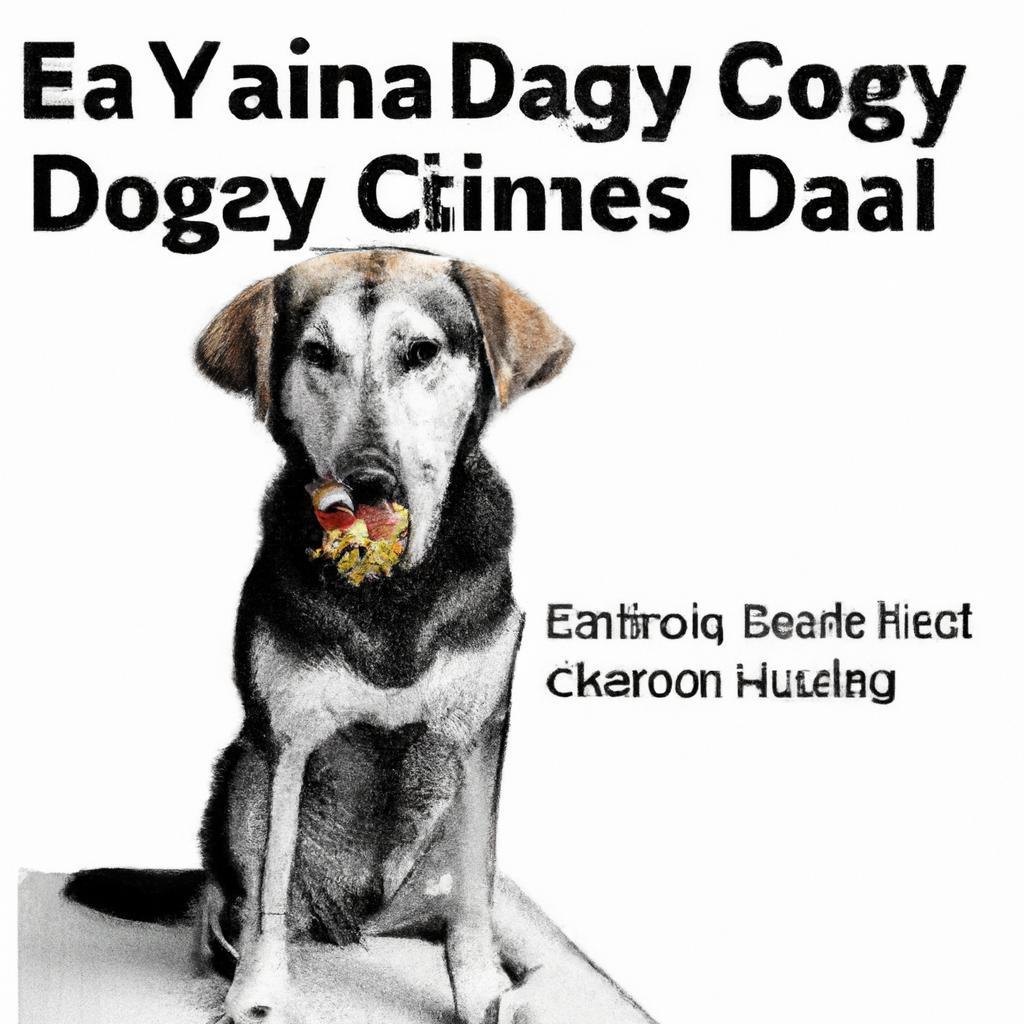Once, a loving pet owner decided to share their dinner with their beloved dog, Max. They tossed him a piece of chocolate cake, thinking it was a treat. Little did they know, chocolate is toxic to dogs. Within hours, Max was in distress, and the vet’s office became their urgent destination. Thankfully, he recovered, but the scare was a wake-up call. Remember, not all human food is safe for our furry friends. To keep your dog healthy and happy, always research before sharing. Choose dog-friendly treats instead!
Contents
- Understanding the Dangers of Common Human Foods for Dogs
- Identifying Toxic Ingredients That Can Harm Your Pet
- Exploring Safe Alternatives to Keep Your Dog Healthy
- Best Practices for Educating Others About Dog Nutrition
- Q&A
Understanding the Dangers of Common Human Foods for Dogs
When it comes to our furry companions, it’s essential to be aware of the potential dangers lurking in our kitchens. Many common human foods can pose serious health risks to dogs, leading to distressing symptoms or even life-threatening conditions. Understanding which foods are harmful is crucial for every pet owner who wants to ensure their dog’s safety and well-being.
One of the most notorious offenders is **chocolate**, which contains theobromine, a compound that dogs metabolize much more slowly than humans. Even small amounts can lead to symptoms such as vomiting, diarrhea, and increased heart rate. In severe cases, it can result in seizures or even death. Similarly, **grapes and raisins** are deceptively innocent but can cause acute kidney failure in dogs, with no known safe quantity. Just a handful can lead to serious health complications, making it vital to keep these fruits out of reach.
Another common food that can be harmful is **onions and garlic**. These members of the allium family can damage a dog’s red blood cells, leading to anemia. Symptoms may not appear immediately, so it’s crucial to be vigilant about any signs of lethargy or weakness after your dog has ingested these foods. Additionally, **avocado** contains persin, which can cause vomiting and diarrhea in dogs, particularly in larger quantities. While some dogs may tolerate small amounts, it’s best to err on the side of caution and avoid giving them this fruit altogether.
Lastly, **xylitol**, a sugar substitute found in many sugar-free products, is extremely toxic to dogs. Even a small amount can lead to a rapid drop in blood sugar, resulting in symptoms like weakness, seizures, and liver failure. It’s essential to check ingredient labels carefully and keep any products containing xylitol securely stored away from your pets. By being informed about these common foods, you can help protect your dog from unnecessary health risks and ensure they lead a happy, healthy life.
Identifying Toxic Ingredients That Can Harm Your Pet
When it comes to keeping your furry friend safe, knowledge is your best ally. Many common foods that humans enjoy can be detrimental to your dog’s health. Understanding which ingredients to avoid is crucial for preventing serious health issues. Here are some of the most toxic substances that should never find their way into your dog’s bowl:
- Chocolate: This beloved treat contains theobromine, which is highly toxic to dogs. Even small amounts can lead to symptoms like vomiting, diarrhea, and in severe cases, seizures or death.
- Onions and Garlic: Both of these ingredients can damage a dog’s red blood cells, leading to anemia. Even cooked forms can be harmful, so it’s best to keep them off your pet’s plate entirely.
- Grapes and Raisins: These seemingly innocent snacks can cause acute kidney failure in dogs. The exact substance that triggers this reaction is still unknown, making it a risky choice for your pet.
- Xylitol: Commonly found in sugar-free products, this artificial sweetener can cause a rapid insulin release in dogs, leading to hypoglycemia. Symptoms can include lethargy, seizures, and even liver failure.
In addition to these well-known hazards, there are other ingredients that may not be as obvious but can still pose a significant threat to your dog’s well-being. For instance, certain nuts, like macadamia nuts, can lead to weakness, tremors, and hyperthermia. Similarly, alcohol, even in small amounts, can be extremely dangerous, resulting in vomiting, coordination problems, and respiratory failure.
- Avocado: While nutritious for humans, avocados contain persin, which can be toxic to dogs, causing vomiting and diarrhea.
- Fatty Foods: Foods high in fat can lead to pancreatitis in dogs, a painful and potentially life-threatening condition.
- Raw Dough: Yeast dough can expand in a dog’s stomach, leading to severe bloating and even rupture. Additionally, the fermentation process produces alcohol, which is toxic.
Being vigilant about what you feed your dog is essential for their health and longevity. Always read labels and be cautious about sharing your meals with your pet. If you’re ever in doubt about a specific ingredient, consult your veterinarian for guidance. By making informed choices, you can ensure that your beloved companion enjoys a safe and healthy diet, free from harmful substances.
Exploring Safe Alternatives to Keep Your Dog Healthy
When it comes to keeping your furry friend healthy, understanding what foods to avoid is crucial. Many common human foods can be harmful or even toxic to dogs. For instance, **chocolate** is notorious for its dangerous effects, as it contains theobromine, which can lead to serious health issues, including seizures and heart problems. Similarly, **grapes and raisins** have been linked to kidney failure in dogs, making them a definite no-go. Always be vigilant about what you share from your plate.
Another category to steer clear of is **certain nuts**. While some nuts may be safe in small quantities, others, like **macadamia nuts**, can cause lethargy, vomiting, and even hyperthermia in dogs. Additionally, **onions and garlic** are part of the allium family and can damage a dog’s red blood cells, leading to anemia. It’s essential to read labels and be cautious about any food that might contain these ingredients.
Moreover, **alcohol** is extremely toxic to dogs, even in small amounts. It can lead to severe health complications, including respiratory failure and death. Similarly, **caffeine**, found in coffee and tea, can cause restlessness, rapid heart rate, and muscle tremors. Keeping these substances out of reach is vital for your dog’s safety and well-being.
Lastly, be wary of **xylitol**, a sugar substitute commonly found in sugar-free products. This ingredient can cause a rapid insulin release in dogs, leading to hypoglycemia, seizures, and liver failure. Always check ingredient lists and opt for dog-specific treats that are formulated to meet their dietary needs. By being informed and cautious, you can ensure a healthier, happier life for your beloved pet.
Best Practices for Educating Others About Dog Nutrition
When educating others about what foods are harmful to dogs, it’s essential to emphasize the importance of understanding canine dietary needs. Many pet owners may not realize that certain human foods can be toxic to dogs. By sharing clear and concise information, you can help prevent accidental poisoning and promote healthier choices for our furry friends.
Start by highlighting the most common foods that should never be given to dogs. These include:
- Chocolate: Contains theobromine, which is highly toxic to dogs.
- Onions and Garlic: Can damage red blood cells and lead to anemia.
- Grapes and Raisins: Known to cause kidney failure in dogs.
- Xylitol: A sugar substitute that can lead to insulin release and liver failure.
Next, it’s crucial to explain the signs of food poisoning in dogs. Educating pet owners on symptoms such as vomiting, diarrhea, lethargy, and abdominal pain can empower them to act quickly if their dog ingests something harmful. Encourage them to seek veterinary assistance immediately if they suspect their dog has eaten any toxic foods. This knowledge can save lives and reduce the risk of serious health issues.
promote the idea of providing a balanced diet tailored to a dog’s specific needs. Encourage pet owners to consult with veterinarians or pet nutritionists to create meal plans that avoid harmful ingredients while ensuring their dogs receive the necessary nutrients. By fostering a community of informed pet owners, we can collectively enhance the well-being of our canine companions and prevent unnecessary health risks.
Q&A
-
What human foods are toxic to dogs?
Several common human foods can be toxic to dogs, including:
- Chocolate: Contains theobromine, which is highly toxic to dogs.
- Onions and Garlic: Can damage red blood cells and lead to anemia.
- Grapes and Raisins: Can cause kidney failure in dogs.
- Xylitol: A sugar substitute that can lead to insulin release and liver failure.
-
Are there any safe alternatives to these toxic foods?
Yes, there are many safe and healthy alternatives you can offer your dog, such as:
- Carrots: A crunchy, low-calorie treat.
- Apples: Remove seeds and core for a nutritious snack.
- Peanut Butter: Ensure it does not contain xylitol.
- Pumpkin: Great for digestion and low in calories.
-
What about cooked bones?
Cooked bones can splinter and cause serious internal injuries. Instead, opt for:
- Raw bones: These are generally safer and can help with dental health.
- Bone-shaped chew toys: Provide a safe alternative for chewing.
-
How can I ensure my dog’s diet is safe?
To ensure your dog’s diet is safe, follow these guidelines:
- Consult your veterinarian: Always check with a vet before introducing new foods.
- Read labels: Be cautious of ingredients in commercial dog foods and treats.
- Stick to dog-specific foods: Use products formulated specifically for canine nutrition.
safeguarding your dog’s health is paramount. By avoiding harmful foods, you ensure a longer, happier life for your furry friend. Always prioritize their well-being and consult your vet for the best dietary choices. Your dog deserves it!

大家好,我是彼得潘,專業的手法身體治療師。我喜歡探索和研究各種主題,並透過與人工智慧的合作分享專業、實用、有趣的文章。我們定期進行人工審核,以確保內容的準確性。如果您發現文章中有任何不準確的地方,請隨時與我們聯繫,我們會及時糾正。您可以透過 [email protected] 與我們聯繫。



